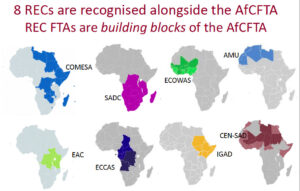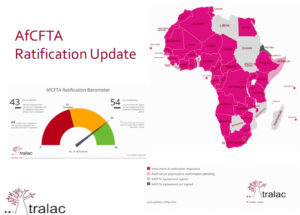Alongside the Regional Economic Communities, the African Continental Free Trade Area (AfCFTA) aims to boost preferential trade in goods and services, economic development and industrialisation.
The continental free trade area is established on an Agreement that provides for several Protocols, including, Trade in Goods, Trade in Services, Investment, Intellectual Property Rights, Competition Policy, Digital Trade, and Women and Youth in Trade.
The AfCFTA agreement entered into force on 30 May 2019, but negotiations are incomplete.
The AfCFTA negotiations take place in phases.
- Phase I covers trade in goods and services and dispute settlement.
- Phase II covers intellectual property rights, investment, and competition policy.
- Phase III covers digital trade and women and youth in trade.

Source: TRALAC
Where does the AfCFTA stand in December 2022?
Phase I
The outstanding matters for Phase I are tariff schedules, rules of origin, the Trade Remedy Guidelines, and services commitments for the five priority sectors for liberalisation. The five sectors are transport, communication, financial, tourism and business services.
Phase II
The negotiations to conclude the outstanding Protocols of Phase II are reportedly well advanced. These negotiations got disrupted by the Covid-19 pandemic. The negotiations are steered by the AfCFTA Council of Ministers and the committee of Senior Trade Officials, with the assistance of the AfCFTA Secretariat.
AfCFTA outcomes and challenges
It is still too early to know the outcomes of the AfCFTA. The 54 participating countries haven’t agreed on the liberalisation of 90% of all tariff lines. Also, the countries are yet to adopt rules of origin for all the relevant products.

In October 2022, the AfCFTA Secretariat launched the Guided Trade Initiative (GTI) for a limited number of products. The GTI involved eight countries and aimed to:
- Test the readiness of participating State Parties under the AfCFTA
- Demonstrate that the AfCFTA trading documents are operational and viable
- Confirm that the Customs and Revenue Authorities of the participating countries are ready to process imports and exports.
The GTI for trade in services will happen in 2023. It will involve State Parties that have adopted schedules of specific services commitments. Countries must indicate the sectors or sub-sectors in which they want to start trading in services and with which countries.
Why does it take so long to finalise the AfCFTA legal instruments?
Economic integration among 54 very diverse countries can be challenging. Africa has the highest number of Least Developed Countries in the world, and many are land-locked or island economies. Some participating countries are concerned about revenue losses when trade in goods is liberalised. Others want to protect domestic industries and local employment.
Also, the outcomes of all negotiations must be adopted through consensus and provide for reciprocity. This will tend to push outcomes to the lowest common denominator. All African Union member states ( including those that haven’t ratified the AfCFTA Agreement) participate in the outstanding negotiations.
The launch of the AfCFTA negotiations has contributed to the renewed interest in Africa by the global community.
In November, the labour movement in Africa issued a declaration calling for the inclusion of labour provisions in the AfCFTA agreement.
“As workers’ organisations, our expectations are that economic transformation will be the basis for sustainable economic development to reverse decades of de-industrialisation and jobless growth to which Africa’s economies have been subjected and create expanded opportunities for decent work and the means of livelihood for our people.”
“The specific interests of workers, women, the youth and other vulnerable groups have not been reflected in the basic design of these protocols, and it is not clear how the belated on-going attempts to fashion protocols on youth and gender can effectively redress the inherent design flaws.”
Sources:
- Trade Law Centre (TRALAC) newsletter
- The ITUC-Africa Trade Union Continental Forum on the AfCFTA
Nelly Nyagah
Nelly Nyagah is the Head of Communications at Labour Research Service.




